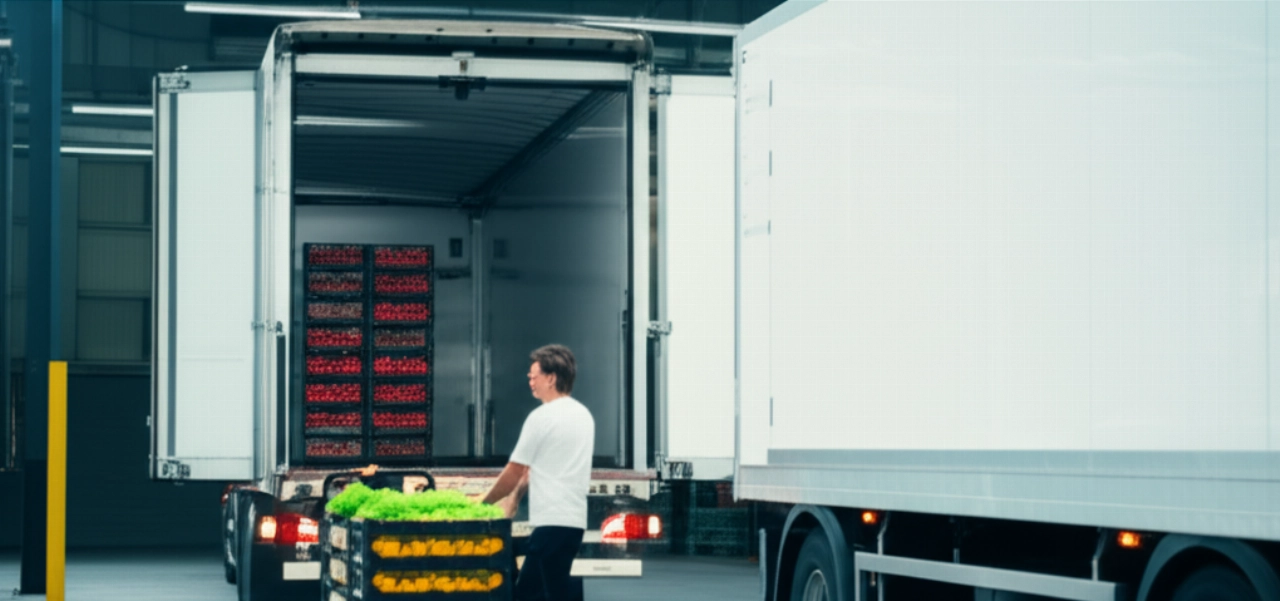Are you a producer, distributor, or restaurateur and the thought of shipping your food products worries you? Do you fear that freshness, quality, and especially hygienic-sanitary safety might be compromised during transit?
Understanding complex HACCP regulations, managing the cold chain, and finding a truly reliable food transport partner can seem like a labyrinth of uncertainties, risks, and hidden costs. Your goods are delicate, perishable, and every mistake can be costly, not only in economic terms but also for your brand's reputation.
In this comprehensive guide, we won't just offer you answers, but we'll provide you with the map to navigate the world of food transport, ensuring your complete peace of mind. We'll show you how to turn complexity into a competitive advantage, ensuring your products arrive at their destination perfect, as if they had just left your production line. Let's begin.

Beyond Delivery: Why Reliable Food Transport is Key to Your Reputation
Food transport is not just a simple movement of goods. It's a critical extension of your production line, a fundamental link connecting your company to the end consumer. Every product you ship carries your name, your quality, your promise.
Relying on an inadequate partner means putting all of this at risk. Non-compliant transport, a break in the cold chain, or even just an unjustified delay, can have devastating consequences:
- Goods deterioration: Food arriving spoiled or with compromised quality, leading to returns, waste, and economic losses.
- Penalties and fines: Failure to comply with hygienic-sanitary and transport regulations can lead to heavy legal and administrative penalties.
- Image and reputation damage: A non-compliant product or a problematic delivery undermines customer trust and can generate negative reviews, which are difficult to recover from.
- Product recalls: In the most severe cases, non-compliance can lead to costly and damaging product recalls from the market.
For this reason, reliable food transport is not a cost, but a true strategic investment. It's the guarantee that your commitment to producing quality food won't be nullified in the last mile. It's the peace of mind knowing that your food safety is protected, from your company to the consumer's table.

The Cold Chain Compass: HACCP and ATP Regulations for Your Food Transport
When it comes to food transport, controlled temperature is the undisputed king. Maintaining the cold chain intact is a categorical imperative, not an option. This is guaranteed by a set of rigorous regulations and protocols.
The HACCP System: A Pillar of Food Safety
The HACCP (Hazard Analysis and Critical Control Points) system is a preventive and systematic approach to food safety, which identifies, evaluates, and controls significant hazards to food safety. In transport, this translates to:
- Temperature control: Constant monitoring and recording of temperatures inside vehicles.
- Vehicle hygiene: Regular cleaning and sanitization of cargo compartments to prevent cross-contamination.
- Staff training: Operators must be qualified and aware of hygiene and safety procedures.
- Traceability: Ability to trace the origin and path of each product batch.
The ATP Agreement: Vehicle Certification
The ATP Agreement (Accord Transport Perishable) is an international regulation that establishes standards for vehicles used in the transport of perishable foodstuffs under controlled temperature. Vehicles must be classified and certified according to their ability to maintain a specific temperature:
- Isothermal vehicles: Equipped with insulated walls that limit heat exchange.
- Refrigerated vehicles: Isothermal vehicles with a cold production device (e.g., eutectic plates) that allows lowering the temperature inside the empty compartment and maintaining it up to +7°C.
- Mechanically refrigerated vehicles: Isothermal vehicles with a refrigeration unit that allows lowering the temperature inside the empty compartment and maintaining it down to -10°C, -20°C, or even lower, depending on the class.
- Heated vehicles: Less common, but used to maintain positive temperatures in cold climates.
Each ATP-certified vehicle is equipped with a certificate indicating its class and expiry date, guaranteeing its suitability for the transport of specific perishable foodstuffs. The choice of the right vehicle depends on the nature of your goods: fresh products, frozen goods, dairy products, meat, fish, etc.
A professional food logistics partner will always provide you with ATP-compliant vehicles equipped with state-of-the-art temperature monitoring systems, with records accessible at any time. This not only ensures regulatory compliance but also offers you the peace of mind that the shelf life of your products will not be compromised.

The 'Do-It-Yourself' Trap and Hidden Costs: Mistakes to Avoid in Food Transport
The temptation to save money on food transport is strong, but it often turns out to be a costly trap. Relying on improvised solutions or non-specialized carriers can lead to problems far more serious than the initial cost.
The Illusion of Immediate Savings
Many are misled by excessively low quotes or the promise of a "friend with a van." But what hides behind these apparent advantages?
- Lack of certifications: The vehicle might not be ATP certified or might not comply with HACCP regulations, exposing you to hefty fines and goods seizure.
- Inadequate vehicle: An unsuitable van cannot guarantee the necessary controlled temperature, leading to goods deterioration.
- Insufficient insurance: Often, insurance policies of non-specialized carriers do not adequately cover the value of perishable goods or damages from cold chain breaks.
- Hidden costs: Surcharges for ZTL (Limited Traffic Zones), waiting times, document management, or even the cost of a new transport if the goods are refused.
Common Mistakes to Avoid
- Underestimating packaging: Even in temperature-controlled transport, adequate packaging (e.g., isothermal containers, well-stabilized pallets) is crucial to protect products from impacts and temperature fluctuations.
- Ignoring documentation: Not having all documents in order (DDT, CMR with temperature indications, HACCP/ATP certificates) can block the shipment and cause legal problems.
- Not checking references: Relying on the first transporter found online without checking past experiences, certifications, and reviews.
- Not specifying requirements: Being vague about temperature needs, delivery times, or type of goods can lead to errors and service failures.
Remember: true savings are not about the lowest cost, but about the safety and reliability that prevent unforeseen problems and costs. Investing in a professional partner is an investment in the continuity and quality of your business.
The Difference Between a Carrier and a Quality Partner: The TrasportoMerci.net Method for Food Transport
At TrasportoMerci.net, we don't just move your food products from point A to point B. We position ourselves as your trusted logistics partner, specialized in food transport, guaranteeing you impeccable service without surprises.
Our method is based on fundamental pillars that set us apart:
- Experience and Specialization: Years of experience in the temperature-controlled transport sector have allowed us to develop a deep understanding of the specific needs of the food industry, from small artisanal productions to large distributions.
- ATP Certified Fleet: We have a wide range of isothermal, refrigerated, and mechanically refrigerated vehicles, all regularly ATP certified and subjected to rigorous maintenance and sanitization checks, to ensure constant maintenance of the cold chain.
- Guaranteed HACCP Compliance: Every phase of the process, from collection to delivery, is managed in full compliance with HACCP regulations, with standardized operating procedures and highly trained personnel on hygiene and food safety.
- Advanced Monitoring Technology: Our vehicles are equipped with traceability and real-time temperature monitoring systems. You can access data and the location of your goods at any time, for total transparency.
- Tailored Solutions: Whether you need refrigerated groupage for small quantities or a dedicated FTL (Full Truck Load), we are able to offer you the most efficient and convenient solution for your needs, optimizing routes and costs.
- Dedicated Assistance and Consulting: Our team of experts is at your disposal to provide consultation on necessary documentation (CMR, DDT), the most suitable packaging, and every bureaucratic and logistical aspect, transforming complexity into simplicity.
Choosing TrasportoMerci.net means choosing a partner who understands the value of your goods and the importance of your reputation. It means entrusting yourself to someone who transforms the complexity of food transport into a clear, secure, and tailored solution for you.
Frequently Asked Questions about Food Transport
What temperatures are guaranteed for food transport?
We guarantee the maintenance of required temperatures for the specific product type, in compliance with ATP and HACCP regulations. Whether it's fresh products (+0°C/+4°C), frozen goods (-18°C/-25°C), or controlled ambient temperature, we have the vehicles and monitoring systems to ensure the ideal thermal range for your goods.
Is my merchandise insured against deterioration?
Yes, all shipments are covered by standard carrier insurance. For food products of particular value or sensitivity, we offer the possibility of stipulating specific all-risk insurance policies, which also cover the risk of deterioration due to cold chain breaks or other events not attributable to the carrier, for greater peace of mind.
How does traceability work for food shipments?
Each of our vehicles is equipped with GPS systems and temperature sensors that allow real-time monitoring. You can access a dedicated platform to check the exact location of your shipment and view the temperature data recorded throughout the entire journey, ensuring maximum transparency and control.
What documents are required for food transport?
For food transport, in addition to standard documents such as the Delivery Note (DDT) or the International Consignment Note (CMR), it is essential that the vehicle is accompanied by a valid ATP certificate. Furthermore, depending on the type of product and destination, specific health or customs certificates may be required. Our team will guide you in preparing all the necessary documentation.
Do you offer services for small quantities or only full loads?
We offer flexible solutions for every need. In addition to dedicated full loads (FTL - Full Truck Load), we also specialize in refrigerated groupage service. This allows us to optimize costs by grouping shipments from different companies with similar temperature requirements, while still ensuring maximum care and compliance with regulations even for small quantities of goods.
Now you have a clear vision of how to approach food transport with maximum safety and professionalism, transforming every shipment into a guarantee of quality for your customers.
Perhaps you think such a specialized service is beyond your reach. In reality, the cost of non-compliant transport or a deteriorated product is infinitely higher. Investing in food safety means protecting your brand and your customers' trust, saving time, money, and stress in the long term.
Don't let uncertainty compromise the quality of your products. Your food goods deserve an impeccable journey, and you deserve the peace of mind of an expert partner. The first step towards this tranquility costs nothing: it's a personalized consultation on your specific food transport needs. Click here, describe your products and your requirements, and receive a clear, detailed, and no-obligation quote. Discover now the solution that guarantees freshness and safety from producer to table.
You might also be interested in: